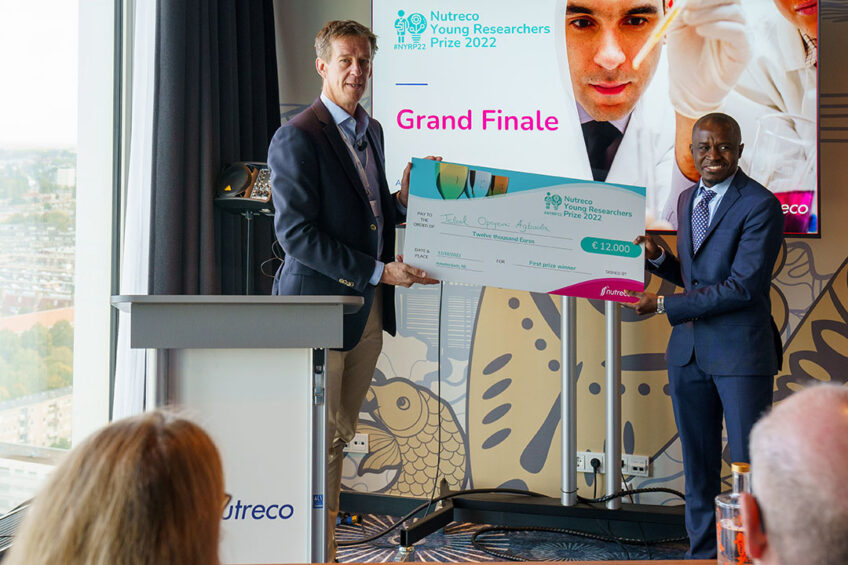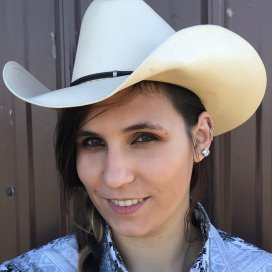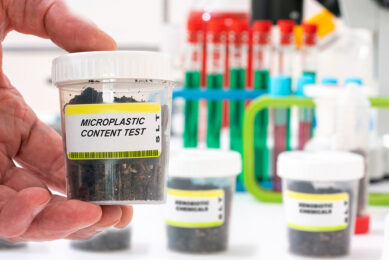Young Researchers’ Prize winner: ‘Can fish grow on trees?’

Nutreco named Jeleel Opeyemi Agboola a winner of the 2022 Young Researchers’ Prize in October. The Nigerian based in Norway is a research fellow in the animal and aquacultural science department at the Norwegian University of Life Sciences in Ås.
The prize recognises PhD students as well as first and second-year postdoctoral researchers for innovative ideas that align with Nutreco’s “Feeding the Future” vision. This year, 37 applicants from all over the world competed for this prestigious award.
Jeleel’s project, “Can fish grow on trees? Yeast as future feed ingredient,” focused on the use of yeast as a feed ingredient in fish diets. Jeleel hopes his work will contribute to greater global food security and sustainability.
Aquaculture sustainability
His hypothesis involved pondering alternative materials and ingredients for fish diets that are both more sustainable than traditional sources and are available locally. By coming up with alternatives, fish farms could become more efficient and reduce their carbon footprint.
Finding sustainability solutions is a global issue that is reflected in what is happening in Norwegian aquaculture, Jeleel explained in an interview.
“While we have only 3% of agricultural land (to grow quality feed, we have a robust timber industry that generates an enormous amount of forestry byproducts,” he said. “We wanted to look at opportunities to convert these low-value materials into a high-value ingredient.”
This led Jeleel to discover how the wood waste could be converted into a form of sugar for fish rations. The answer was to convert it into yeast.
In the Norwegian aquaculture industry, only 7-8% of the ingredients in the diet originate from Norway,” Jeleel explained. “The rest are sourced from abroad. These present sustainability challenges.”
My overarching goal in life is to contribute to food security around the world.
Deserved recognition
For Jeleel, receiving Nutreco’s Young Researchers’ Prize has been exceptionally rewarding because it is a testament to the impactful nature of his research.
“I wanted to make a transition from animal science to aquaculture science because I saw the potential in aquaculture. My overarching goal in life is to contribute to food security around the world.”
The challenge
One of his biggest challenges during the trials was producing and processing yeasts in adequate quantities. He explores how to incorporate them into feeds by conducting effective trials and obtaining viable, applicable results.
To meet that challenge, he worked alongside a colleague on the initial creation of the yeast and then again when he transformed it into a form that can be used in fish feed. Initially, 3 non-saccharomyces yeasts (Cyberlindnera jadinii, Wickerhamomyces anomalus and Blastobotrys adeninivorans) were used at the outset of the research. However, C. jadinii and W. anomalus were recommended, based on their nutritional and health benefits.
Wanting to become more engaged with aquaculture, Jeleel started following and interacting with various industry groups through social media; here he discovered Nutreco.
Second time was a charm
He initially applied for the competition when evaluating his preliminary results in 2019. Though he was not chosen then, he was not dismayed and remained connected, with the goal of reapplying.
For his research to be effective, Jeleel needed to extend his knowledge beyond academics. He became familiar with the industry side of aquaculture and did not forget his roots in the animal nutrition space.
When Jeleel learned of the application deadline this year, he hesitated only momentarily. It was a hectic point in his academic career: he was wrapping up his research and working to defend his thesis. After presenting his thesis and earning his PhD, he submitted his prize-winning application.
Moving beyond the lab
Jeleel’s award-winning research has wide-ranging applications for companies such as Nutreco.
And using the knowledge generated during Jeleel’s research, the industrial partners involved in the project are now already producing large amounts of yeasts from wood sugars.
“The efficacy of this product is really good,” he noted. “It’s another thing to take it out to a typical fish farm and see whether what we find in the lab can be easily replicated.”
Jeleel and the team are pleased with their success thus far in moving this research into the real world. “I think my biggest reward, beyond seeing applications for my research, is that the industry is already adopting this technique. That really gives me unparalleled joy.”
Though yeasts are currently more expensive than conventional fishmeal and plant-protein ingredients used in fish feeds, every effort is a step in the right direction. With ongoing research and real-world use, the potential to drastically reduce dependence on dwindling resources improves. Less pressure is also placed on the oceans by substituting for the feed currently used.
Could yeast reduce the need of antibiotics?
The use of yeast in fish rations has the potential to resolve another issue facing the aquaculture industry: the use of antibiotics, which can lead to antimicrobial resistance. Jeleel’s research not only addresses nutritional needs, but it can also increase the robustness of fish by boosting immunity.
Jeleel would like to become more involved with the aquaculture industry so that he can extend his knowledge outside of the academic realm. He hopes to apply his research in real time and scale it up to help the industry address challenges.
What the future holds
He views this prize and its funding as an opportunity to continue his research. He hopes to answer some of his follow-up questions, such as what are the potential effects down the line from feeding yeast to fish. He would also like to use some of the prize money for personal growth, which can improve his understanding and perspective of the industry.
“My advice to every young scientist is to always cultivate a curious mindset,” he stated in the official Nutreco press release. He encourages everyone who is considering next year’s contest to do so without hesitation. “Having also applied in 2019, I’m a prime example showing that, no matter the challenge, you can achieve anything you put your mind to if you work hard and truly believe in yourself.”











